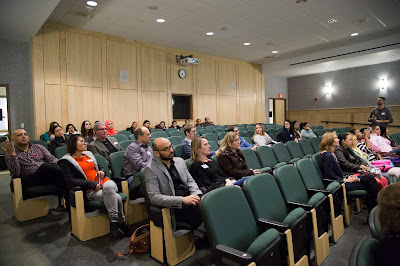Last month, we (the Center for English as a Second Language) hosted the Shawnee Hills IEP Camp at Southern Illinois University Carbondale. I blogged about how we were able to organize and host it in a previous post. As mentioned in that post, we followed the EdCamp model and shared our professional learning with IEP faculty and staff from the University of Southern Indiana and from Southeast Missouri State University. Our program (CESL) was also hosting English language teachers from Panama, who also attended the Camp.
Starting early at 8am in the morning, we had a very good turnout with around 65 of the registered 70 participants showing up. Above is a picture of some of the earlier attendees mingling over our sponsored and catered breakfast from yummy Cristaudo's Bakery of Carbondale. They have always been a dependable and popular caterer at CESL events.
Pictured above is a couple of our faculty members with our Panamanian visiting students/teachers. We were grateful to have unseasonably warm weather for our IEP Camp, which involved us walking between a few buildings throughout the day.
Our first outdoor trek was to SIU's Morris Library, where I (that's me behind the podium) officially welcomed everyone to the IEP Camp and explained the concept of EdCamps to them in about 5-10 minutes. Then we proceeded to choose session topics based on our interests, questions, and concerns.
In the pictures above you can see a few people pitching their ideas. One of our faculty volunteered to pass around the microphone. You can see him in his gray sweatshirt standing. In the top picture, one of our faculty suggested a discussion about integrating technology in and beyond the IEP classroom. In the bottom picture, one of our staff members suggested a topic about increasing opportunities for international students studying abroad.
Below are selected highlights from our concurrent sessions during the day:
None of this would have been possible with the support of our sponsors, so I'd like to end this post thanking our sponsors.
















Comments